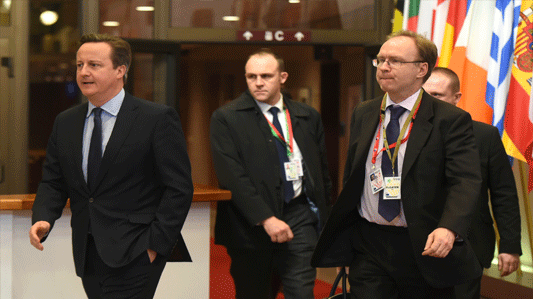Theresa May moved extremely quickly to appoint our new man in Brussels after the resignation of Sir Ivan Rogers, Britain’s Permanent Representative to the European Union.
The email Sir Ivan had sent to his team starkly brought to light just how alarmed many officials seem to be that the government is failing to get to grips with the business of negotiating an orderly Brexit that will prove beneficial to this country. Is the government up to the job and does the Prime Minister even know what she’s trying to achieve?
Sir Ivan’s departure had caught the government on the hop. It appears that he gave No 10 no warning of his decision, taken while he was on holiday in Dorset, and the first government ministers knew about it was when the valedictory email Sir Ivan sent his colleagues back in Brussels was leaked. It was not so much the resignation (Sir Ivan was due to end his stint later this year anyway) but the contents of his email that caused the furore and exposed the government to the accusation that it is floundering.
Predictably for a diplomat, Sir Ivan couched his remarks in the seemingly harmless form of departing advice as to how his remaining colleagues should conduct themselves. But it was perfectly clear that this was code for an expression of deep frustration at the way he himself had been treated by ministers and a fundamental criticism of the way those ministers were approaching the task of bringing about Brexit.
Sir Ivan urged his former staff to ‘continue to challenge ill-founded arguments and muddled thinking’ and urged them ‘never be afraid to speak the truth to those in power’. The implication was that it won’t be easy because he went on: ‘I hope that you will support each other in those difficult moments where you have to deliver messages that are disagreeable to those who need to hear them.’
But even more damning than these implicit criticisms of ministers’ clear-headedness and readiness to listen to unwelcome news was his explicit comment that the government didn’t even know yet what it was trying to achieve. In what will seem to many an astonishing comment about the government’s position over six months after the referendum, he said: ‘We do not yet know what the government will set as negotiating objectives for the UK’s relationship with the EU after exit’. Coming from the man charged with trying to secure those objectives, the remark is dynamite.
And there was more: not only did the government not know what its objectives were, but it had not yet set up a system for trying to deliver them once they were established. He said; ‘The structure of the UK’s negotiating team and the allocation of roles and responsibilities to support that team needs rapid resolution.’
Defenders of the Prime Minister retort that she has always said she would refuse to provide a ‘running commentary’ on the process of Brexit and that it would be an absurd way to conduct a negotiation to reveal your hand at the outset. But Sir Ivan’s criticism is not that the government has failed to be open about its strategy and tactics for securing its ends but that it hasn’t even worked out what those ends are. And the reason for that, say the government’s critics, is that it is wholly at sea about its objectives because it can’t agree them.
At the centre of the disagreement is what sort of trade agreement it wants with the EU once Britain has left it. Sir Ivan made clear reference to this in his email in what was seen as a dig at Liam Fox, the international trade secretary: ‘Contrary to the beliefs of some, free trade does not just happen when it is not thwarted by authorities. Increasing access to other markets and consumer choice in our own depends on the deals, multilateral, plurilateral and bilateral, that we strike and the terms that we agree.’ It would seem that this is an example of the ‘ill-founded arguments and muddled thinking’ he had referred to because he added: ‘I shall advise my successor to continue to make these points’.
Sir Ivan had got into hot water in the autumn when another leaked email revealed that he had warned ministers that securing a post-Brexit trade deal with the EU could take a decade to negotiate. This led to an attack on him by pro-Brexit politicians who believe that leaving the EU will prove a much less difficult business and who consequently dubbed him a ‘doom-monger’ whose ‘heart was not in it’.
To them his resignation was wholly welcome. But the attacks on him by politicians and his implicit account of his own treatment by ministers rallied former senior civil servants and retired mandarins to a defence not only of him but also of the whole system of an independent, unpolitical civil service that can ‘speak truth to power’. Lord Ricketts, the former head of the Foreign Office, said: ‘If Ivan feels he didn’t have back-up from ministers – and he didn’t – that’s a bad sign’. And Lord Macpherson, the former head of the Treasury, tweeted simply that Sir Ivan had been ‘sacked for being right’.
The Prime Minister has sought to calm the situation by resisting pressure to make a political appointment to replace Sir Ivan and has instead given the job to a senior diplomat, Sir Tim Barrow. In doing so she has reasserted belief in the traditional role of impartial, professional civil servants. But the substance of Sir Ivan’s criticisms of the way the government is approaching Brexit remains.
The chief criticism is that the government needs to declare what its chief, non-negotiable objectives are, so that diplomats like Sir Ivan and Sir Tim can start to work out how best to achieve them. For example, if the government’s non-negotiable aims for Brexit are to regain total control of immigration and to extricate Britain from the jurisdiction of the European Court of Justice, then it follows that Britain cannot hope to remain a member of the single market. Similarly, if Britain is not going to compromise on its determination to conduct all its own future trade agreements, than it cannot remain a member of the customs union. And if it has an overriding aim of an orderly transition to a new life after Brexit, it needs to make clear its wish to negotiate a transitional deal to come into force when the two years allowed for an EU country to leave are up.
These are the sort of objectives Sir Ivan implies the government needs to come clean about if only so that people like him can do their job. The trouble is that Mrs May knows that once she commits herself to some non-negotiable objectives, she will come under huge attack from those who believe she will have to pay far too high a price to secure them. If, for example, she is adamant about control of immigration and is prepared to take it on the chin about leaving the single market she will be accused of taking reckless risks with the economy. The same applies if she is ready to walk out of the customs union because she is adamant that all Britain’s trade deals must be in the hands of Liam Fox,
The Prime Minister is due to make a speech about Brexit in the next couple of weeks. We shall then know whether or not the charge that the government’s position is based on ‘ill-founded arguments and muddled thinking’ is justified and whether or not it has finally got to grips with Brexit and has started to know what it wants.
What do you make of Sir Ivan Rogers’ resignation and his broadside against the government? Does his implicit claim that the government doesn’t know what it’s doing ring true? Do you think this government is prepared to listen to the ‘unvarnished’ advice of civil servants or not? And do you think the government will be able to negotiate an orderly Brexit or that we are heading for chaos because the government isn’t up to it?








